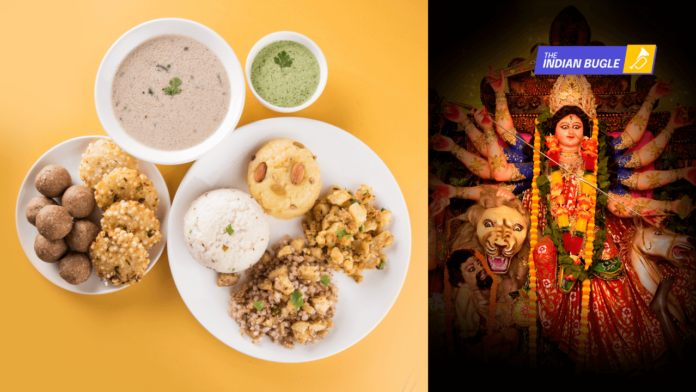Fasting during Navratri is a beautiful way to connect with Goddess Durga while detoxifying the body. However, many devotees make mistakes that affect both their health and the true essence of fasting. Here are the most common pitfalls to avoid during this Navratri:
Skipping Water
Devotees sometimes forget to drink enough water, coconut water, or herbal drinks. This can cause dehydration, weakness, and headaches, especially during long fasting hours.
Some devotees reduce their water intake or practice nirjala fasting without consulting a doctor. Dehydration can lead to dizziness, headaches, and fatigue. Staying hydrated with water, coconut water, or lemon water is essential.
Overeating Fried and Heavy Foods
Many people end up eating deep-fried snacks like pakoras, chips, or pooris excessively. This defeats the purpose of detox and causes acidity, bloating, and lethargy.
From pakoras to pooris, many vrat meals become calorie-heavy. Overeating fried foods can cause acidity, bloating, and low energy instead of lightness and detoxification.
Relying Only on Carbs
Potatoes, sabudana, and kuttu pakoras are popular options, but relying solely on carbs can lead to energy spikes and crashes. Pairing them with proteins and fibers keeps you fuller and more energetic.
Ignoring Proteins
A protein deficiency during fasting makes you feel weak and tired. Nuts, seeds, yogurt, paneer, and amaranth (rajgira) are excellent vrat-friendly protein sources.
Forgetting Fibre
Skipping fruits, vegetables, and nuts results in poor digestion and constipation. Fresh fruits, bottle gourd (lauki), pumpkin, and leafy greens (where allowed) provide essential fiber.
Long Gaps Between Meals
Fasting doesn’t mean starving all day. Long gaps between meals lower blood sugar, leading to irritability and headaches. Instead, eat small, frequent meals of fruits, dry fruits, and light vrat foods.
Skipping Balanced Nutrition
Many stick only to potatoes, sabudana, or sweets. This creates a lack of fiber, protein, and essential nutrients. Including fruits, nuts, yogurt, and vrat-friendly flours (kuttu, singhara, rajgira) keeps the diet balanced.
Eating Packaged ‘Vrat’ Foods
Ready-made chips, namkeens, and sweets marketed for Navratri are often oily and high in preservatives. Opt for homemade snacks like roasted makhana, fresh fruits, and kheer made from vrat-friendly flours.
Excessive Use of Rock Salt (Sendha Namak) and sweet
While allowed, too much rock salt can cause water retention and high blood pressure. Use it in moderation. Eating lots of halwa, laddoos, or sugary drinks during fasting can cause a spike in blood sugar levels, leading to fatigue and irritability later.
Skipping Proper Sleep
Devotees sometimes stay up late for prayers but skip rest. Poor sleep during fasting weakens immunity and reduces concentration in prayers. Balance rest and devotion for overall well-being.
Ignoring Iron Intake
Fasting often limits iron-rich foods. Ignoring iron can cause fatigue, especially for women. Include raisins, dates, lotus seeds, and pumpkin seeds to maintain iron levels.
Fasting Without Medical Advice
People with diabetes, high BP, or other conditions sometimes fast without consulting a doctor. This can be risky. Always seek medical advice before observing strict fasts.
Forgetting the Spiritual Essence
Navratri fasting is not just about food—it’s about purification of the mind and soul. Devotees often focus only on diet and forget prayers, meditation, and self-reflection, which are equally important.
Not Listening to the Body
Some people keep strict fasts (nirjala – without water or food) even when they feel dizzy or unwell. This can harm health. Fasting should be done according to one’s physical capacity.
Navratri fasting can be a divine experience when done mindfully. Avoiding these mistakes ensures you stay healthy, energetic, and spiritually connected. This Navratri, balance devotion with nutrition and self-care for a truly fulfilling celebration.
